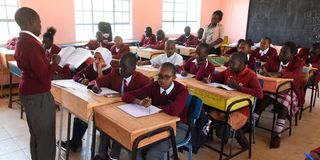Ensure equity in school bursaries

A teacher and her junior secondary school students in the classroom during a lesson. There should be equity in bursary allocations.
The recently released National Government Constituency Development Fund (NG-CDF) has a component of funds to be allocated to needy students as bursaries at various levels of the education structure.
Consequently, there is a flurry of activity taking place—including application, shortlisting and award of funds to students in every constituency—attracting a lot of media publicity.
Observers tend to compare the formulae used in different constituencies to judge which of them is the fairest; meaning that equity is a major concern to these observers.
There are also bursaries being awarded by the governors and the members of the county assembly (MCAs) through their own kitties that target the same recipients; hence, one may find one student making three applications for assistance at the same time.
One gets the unfortunate impression that fairness may not be adhered to in all cases, especially when the leadership of the source of the funds have no objective criterion of allocating them or mistake equality of treatment of applicants for equity considerations or simply waver in their decisions, depending on pressure from supporters and advisers.
Equity here means the quality of being fair and impartial while equality is the state of being equal in the availed opportunity.
Many financial institutions and donors, such as the Equity Bank, have established systems through which bright but poor students are identified objectively and transparently awarded scholarships. One would expect that governors, MPs and MCAs, who are closer to the people—unlike the bank, which is run from Nairobi—would find it easier to identify the actually needy student on the basis of their proximity and historical data.
However, one often finds in several constituencies students who are, for example, required to pay fees of up to Sh53,000 being awarded less than Sh12,000 and yet they are orphans who cannot even afford fare from home to school. The school will receive the allocated amount and ask the student to pay the difference. This way, the purpose of the bursary fund is not achieved while the student does not even utilise the little allocated.
Overcome challenges
Internationally, there are various ways through which the poor are deliberately assisted by governments to overcome or ameliorate their challenges. In India, for example, a law enacted in 1947 makes it mandatory for the government to assist the lower caste in the provision of social services, including education integration and being treated preferentially in employment. This way, the poor benefit more from government assistance than the rich because that would be the only way to lift them out of absolute poverty.
It is positive discrimination.
Similarly, the Constitution provides for the Equalization Fund which requires the National Treasury to allocate additional resources to marginalised counties over and above those given to the rest. These counties are treated preferentially owing to their historical circumstances just like individual students should equally be treated because of their poverty. The Higher Education Loans Board (Helb) operates on the same concept—assist the poor and marginalised through a study loan system, not a grant. This promotes the poor to climb the social ladder.
The Kenya Kwanza government, having promised to uplift the poor and marginalised, should consider all or some of the following interventions. First, could orphans that may have been left without much inheritance be considered for bursaries for the full or even two-thirds of the required amounts? Could the rest of the applicants be awarded on a pro-rata basis depending on the actual need after the physical visitation of their homes?
Secondly, could Parliament enact laws to compel bursary providers to use objective criteria on the basis of a uniform template? Thirdly, could the Treasury, in conjunction with elected representatives, find ways and means of harmonising bursaries through governors, NG-CDF and MCAs to avoid duplication? Fourth, could limits be set on the bursaries in relation to the national allocation to those counties to avoid extreme variations?
Meanwhile, has the Ministry of Education considered granting money to schools’ boards of management to purchase textbooks on the basis of need—as it used to be, as opposed to the current central procurement system? That would promote the ‘hustler-owned’ small-scale bookshops in the spirit of the “bottom-up” economic model.
Mr Sogomo, an education expert, is a former Secretary of TSC. [email protected]. @Bsogomo





